- Home
- Hugo Hamilton
The Pages Page 15
The Pages Read online
Page 15
It’s nothing, Armin said.
It’s not nothing, Armin.
I’m OK, seriously.
You’re covered in blood.
She pointed to the cluster of drops on the ground, then took some Kleenex out of her bag and wiped his face. He held an entire packet of tissues up to his nose.
She brought him to a restaurant nearby so he could get himself cleaned up and they could have a drink to recover. The waiter seemed a little uneasy at first. The sight of blood made him back off initially – it’s the colour of violence. Armin returned from the bathroom like a new man, concealing the bloodstains on his shirt with his arm held across his chest. They sat for a while at a table by the window and had a bottle of Beck’s Gold each.
It came from nowhere. As soon as they were back out on the street again, it seemed inevitable. That moment she used to describe, as a child, as ‘cut between’. Whenever she watched a movie on TV with her father as a ten-year-old girl and a couple began to kiss on screen, she would shout the words and bury her face in a pillow. Here she was, leaning into that movie scene without a thought.
As they moved on again, Armin insisted on pulling her case, that rolling sound of somebody returning late from a holiday in some warm place. They could not find a taxi, so they took the U-Bahn. The smell of the U-Bahn in Berlin, Lena said, was unlike any other underground network in the world. Some unique identity of its own, as distinct as woodsmoke or candle wax. Or was it the inside of a rubber ball? A combination of coffee and chewing gum and hair products and everything else worn by the people who travel on those yellow trains each day.
Back in Julia’s apartment, Lena dropped her bag at the door. She began removing Armin’s bloodstained shirt. As they stood in her bedroom, she asked about the shrapnel fragments inside his body and began tracing her finger over the scars where the metal pieces had entered when he was a child. They had stretched a little as he became older. She wanted to know if they bothered him, did it ever hurt? He said he couldn’t feel a thing, no more than he could feel his own liver.
I wonder what they look like, she said.
They’re like any normal body piercings, he said. I’ve made them safe. They can’t hurt anyone else now.
You were lucky with this one, she said. That’s close. A few millimetres further over and it might have gone straight through your heart.
Wait, he said.
Armin walked out to the kitchen. His bare feet could be heard slapping across the wooden floor. There was a brightness coming in from the street and no need to turn on the lights. He went to the fridge and took down a couple of magnets, leaving the notes they were holding up – theatre tickets, gallery flyers, laundry receipts – on the table. He came walking back through the wide living room and stood in front of Lena.
Here, he said. Why don’t you put them on?
Attach them, you mean?
See if they work.
She took the fridge magnets from his hand and began placing them one by one onto those scars that corresponded with the shrapnel inside his body. On his hip, she placed one in the shape of a hamburger. Another on his thigh with the name of a restaurant called Max and Moritz. The one close to his heart was a bottle of Russian vodka. They remained attached. He was magnetized. She threw her arms around him and they fell back on the bed laughing.
35
Why do people shut their eyes when they kiss? Is it because they are too close and everything becomes blurred? Do they need to eliminate the faculty of sight to open up that vast landscape of lips and tongues in the mind? The unlimited distances of the human mouth. Like travelling in space. Infinity. Like walking into Einstein’s library.
And how do you describe love?
Fontane kept it short. His description of Effi Briest’s frozen fingers being gently prised apart with kisses does it all. Another German writer once cut it down to a single line – then for a while it was nice. A British writer reduced it to a brief tangle of pubic hair. A female author living in the USA describes a woman waking up after a year spent in a drug-induced sleep with the vague memory of her boyfriend’s testicles sweeping across her face.
What more is there to say?
It’s only afterwards, looking back in words, that anything becomes memorable. How it came to a decision to sleep with Armin is not something Lena discussed with anyone. It may have been a spontaneous thing. It may have been coming down the tracks ever since Lena’s bag was stolen and Armin found her discarded book lying on the ground in Görlitzer Park.
She did say one thing. While they lay still afterwards with the light from the street spilling across their bodies and some late-night voices coming in from outside, she told Armin that she had felt something sharp digging into her back. It gave her the feeling that one of the shrapnel pieces inside his body had come loose. She laughed and said it made no sense. It was one of the fridge magnets, of course, but she continued to believe it was one of his shrapnel fragments that had been dislodged by all the movement and she didn’t want to remove it. She was not sure it could be described as pain. A sensation that kept coming back again and again as a reminder that what was happening was true, it was not imagined.
Look, she said.
She pointed to a bruise low down on her back and said that was certified proof.
Armin patted his hands up and down along his body as though he was checking for his wallet.
They laughed.
She placed her head on his shoulder and they lay silent for a while, dreaming with open eyes.
Inside her bag on the floor of the living room, her phone buzzed a couple of times. The messages were coming from far away, from another time zone.
It was Mike.
Are you still up?
It was early evening over there in the US and he was calling to see if she was awake and up for a chat. He eventually assumed she was asleep and left a message saying he would catch up with her in the morning. A short while later he followed on with an audio message which she only played back to herself the next day when she was alone again.
It was Mike saying – I’m here in a gas station outside Des Moines. And I’m looking at this man sitting in front of me and he’s got three double burgers on a tray and three boxes of fries and three large Diet Cokes on another. Like he’s gone for the Mega Meal three times. He’s making his way through them all and I’m wondering why he doesn’t just get one at a time, it’s not like he’s getting a reduction. And while he’s eating, he’s looking straight ahead without seeing me. Like he’s completely focused on the food. Going through the whole lot as if it’s his job, lifting the hamburger to his mouth, then picking up a couple fries with his fingers, then taking a sip of his Coke through the straw. Every now and then he swirls the Coke around to hear the ice inside, or maybe to guess how much is left.
And it looks like he’s not really thinking about anything. It’s hard to know. Anyway, Mike said in a low voice that had the restaurant house music playing in the background, you know the way you look at somebody for long enough and you gradually become them. You kind of imagine you are that person. You take on their mannerisms.
Here I am, he said, and I think I’ve turned into this man in front of me. Like I’ve just made my way through three of those double burgers and all the fries and I’m just washing it down with the last of the Coke, waiting for that slurping sound to come up through the straw at the end. And you know what, I bet he’s desperately lonely.
Jesus, Lena, you won’t believe how much I miss you, here in this place on the highway, and I’m not able to say exactly why, but I feel like that guy eating just to stay in the world.
36
And what about that day at the sanatorium in Vienna? The day Roth goes to visit and finds himself alone with his wife inside one of those vertical coffins. Nothing in that padded cell that might give her cause to self-harm. Nothing but the stool bolted to the floor a
nd the cold Viennese light dripping in through the high window, not enough to spread into the corners.
He speaks to her. He says her name and tells her the news from the world outside. He has brought his stories from the streets of Paris, the cafés, the world is still free, people have been asking for her. There will be such a great welcome for her when she gets better.
She remains unresponsive. What is there for her to report but the same routine interrogation by the psychiatric team about her thoughts, her feelings, her dreams, her sexual fantasies. The same greasy smells of dinner lingering in the walls, voices coming and going, faces unrecognizable, echoes following her back to her room and the screaming at night from deep inside a vertical coffin next to hers. The same walks around the grounds of the hospital. The same avenue of trees and the brief slice of sky, the same windows replicating themselves each day in this house of doubt. In the corridor, the sound of keys always coming to the wrong door.
He has come with his smile to restore her. He has brought the smell of smoke in his suit and laughs as he tells her it was bought for him by his friend Stefan Zweig when he spilled wine on his trousers. He has brought the sound of trains and platform whistles, the click of tracks, the screech of wheels. His eyes are alive with affection. His moustache. His cravat. His calm voice. His jokes will cure what all those psychiatric assessments have failed to understand. His hands are the only viable intervention left, like his own delicate handwriting, touching her face to remove a dried smudge of tear dust from her cheek.
Come on, she says.
Her eyes speak to his. She has it back, that provocative smile in her mouth. She takes his hand and invites him to dance with her around this anonymous room. His other hand is holding on to one of her cold kidneys at the back while she is humming along to the music inside her head, laughing and using his nickname – Mu. The one she made up from his second name, Moses.
Come on, Mu, you haven’t danced with me in ages.
His shoes squeak on the rubber floor. Her bare feet are silent. Around and around the stool fixed to the centre of the dance floor they swing to a tempo that begins to gather speed, a Viennese waltz that converts this small institutional space into a grand ballroom with ornate ceilings and golden columns. Her madness has purpose now. She flings his name at the rubber walls with accelerated joy and rage. An absurd force in her laughter, like the needle of a compass inside her head pointing to something that needs to be repossessed right away before it’s gone again.
You always take your time, Mu.
Her need for human warmth is urgent. Her tormented desires are now free to express themselves. All those possibilities, all the novels not yet written by her body, come to life with such conviction in his company. She can feel the energy in his lungs. She can feel the cool buttons of his suit. She can feel the soft weight of his writing hand. She can feel the padded floor against her back as they lie down together with the light on the ceiling buzzing like a trapped wasp. She can hear the sound of keys and doors and people whispering in the corridor.
She smiles and turns her head calmly towards the stool bolted to the floor as if there is somebody sitting there watching them.
It’s my husband, she says to the invisible spectator. His name is Joseph Roth. He’s a good storyteller. He can make things up that I could never imagine.
On the squeaky floor of this cell intended to prevent suicide, they spend the night together. Locked inside a room from which he has come to rescue her. Their confinement becomes their escape. Their marriage, their identity, their memory, the forces of hatred turned against them, the restless places they have travelled to and found freedom, the entire story of their love has been shaped into this one short, terminal moment of luck and misfortune. Surrounded by harm in a space that allows no harm, they keep each other close. He kisses her forehead and she lays her head on his shoulder. With the walls smelling like the interior of a car tyre, they lie awake in a time void.
She can’t sleep. She sits up and speaks to the door as though there is a team of doctors and nurses standing in the room with their charts observing her. She tells them to write down in the file – the man who brought her here came to take her away. She tells them to bring her clothes first thing in the morning, she will walk out hand in hand with him into the street, they will get on a tram together, straight to the main train station.
We’re going back to Paris, isn’t that so?
In a letter written to his publisher, Hermann Kesten, in 1971, Joseph Roth is reported to have said that he made love to his wife inside a padded cell on the advice of psychiatric experts. It was a private matter between husband and wife, not entered into the medical records. What is recorded in the case notes on repeated occasions is this statement in her own words – the person who brought me in here should come and take me out again.
37
When Julia returned from Hamburg, she opened the gallery one morning to find a hand-delivered envelope in the mail. It had no addressee. Inside, she found the printed page of a book and a newspaper cutting. An interview with Madina Schneider alongside a photo of her taken on a bridge in Berlin. The loose book page had been defaced with a swastika. The familiar Nazi symbol was scrawled with a red marker that came through like a blurred mirror image on the reverse side.
The missing page. Cut from my ribcage when Armin made his payment in the barber shop.
Weird, Julia said on the phone to Lena. You better come down.
I’ll be there right away, Lena said. She was not far away, working in her new studio.
You should let Armin know, Julia said.
What?
It’s got to do with his sister, I think.
The interview with Madina describes her as a new talent with limited previous media exposure in Germany. So far, she’s better known in Holland, where she is in discussion with a company about recording her first album. The journalist reveals that the singer travels with a collection of artificial legs, each of them different – like you wear different clothes for certain occasions, Madina is quoted as saying. Some of them have flashing lights, others are decorated with various absurd things like medical tubes and bandages, depending on her mood. She is proud of her prosthetic leg, the journalist writes, and she jokes about getting a parrot, if that isn’t a bit cruel to take a live bird on tour, maybe a false one would be more appropriate. She talks about the parrot once found by Humboldt, the great German explorer, speaking the language of a lost Amazonian tribe.
The journalist goes into her Chechen background, though the biographical details are thin. The singer lost her family during the Second Chechen War, it says, after which she and her surviving brother were brought to Germany by an aunt. They grew up in Frankfurt with a family that she cannot possibly say enough good things about.
Madina has no intention of going to Chechnya while the leader of that country posts photographs of himself lying around with a tiger.
The interview goes on to say that her music allows her to express the longing for what is missing. The absence of a backstory is what got me singing, she says, something she picked up from her adoptive mother, who is from the former East Germany. She used to sing at the top of her voice around the house to make up for the gaps in her biography. Your life is a bit of a fabrication anyway, Madina says of herself. Like a song. With an accordion solo in the middle. It’s never going to be any more than – based on a true story. What was it her father used to say – biography, the story you call your life?
My story is prosthetic.
Her quote is pulled out of the interview for the headline. The caption underneath the photo says the Chechen-born singer is in training to run the Berlin Marathon.
It’s raining heavily by the time Lena arrives. I can feel the dampness in my pages. The character in my story feels it in the stump of his amputated leg. Lena gives a shudder as she comes in the door. The water is heard dripping on a steel window led
ge outside and I have that sensation of being confined indoors, like a deferred sneeze. She leaves her umbrella open by the entrance, forming a series of pools on the floor.
Shouldn’t you bring this to the police, Lena?
Wait. Let me talk to Armin.
Looks like a death threat, Julia says. We shouldn’t have touched it, there might be fingerprints.
Let me figure this out with Armin.
While they wait for Armin to arrive, I become reunited with the missing page. It’s a great moment for me. That feeling of being intact. Lena goes about fitting the severed page back into place with tiny strips of adhesive paper on each side. It might be somewhat predictable to say this, but it feels like having your leg reattached by an expert surgeon, hinging perfectly back and forth at the knee joint. Julia begins to unpack some of the artworks that have arrived for her next exhibition. A collection of nudes painted by a female artist celebrating the flesh of women with all their pudginess and blue veins showing.
My story is complete again. All my fingers and toes, page numbering correct.
The reattached page begins to tell me where it’s been all this time. It sat folded up in the inner pocket of a leather jacket belonging to the man who defaced it with the red marker. Ulrich Bogdanov. He never takes that leather jacket off. I was forced to witness everything first-hand, the rediscovered page says. The way he eats, the way he slouches in his chair with the phone, the way he talks to his wife. I even had to accompany him into the bathroom.
The lost and found page goes on to describe that time in captivity as an eye-opener. Bogdanov, it says, seems at first not to be such a bad person at all. He works in a retirement home for the elderly. You would have to be decent enough to even want to take up a job like that.
I’ve seen him with some of the patients, the mutilated page says. He can be extremely kind. Their infirmity doesn’t bother him. Their smells. Their morbidity doesn’t put him off life. In fact, it seems to enhance his lust, knowing that he is young and they are old. I have seen him, for example, the page recalls from its days in captivity, wiping the bum of an old man and then going home to have sex with his wife no more than an hour later. She wanted him to have a shower first. She said he smelled of old people. But he looked on it as part of the same sequence of life, the arc of time going backwards, cleaning the shit from an incontinent old man’s legs in an operation that lasted twenty-five minutes, followed by urgent sexual activity with his wife, lasting no more than three to four minutes.

 Dublin Palms
Dublin Palms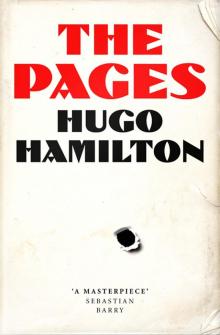 The Pages
The Pages The Sailor in the Wardrobe
The Sailor in the Wardrobe Every Single Minute
Every Single Minute Hand in the Fire
Hand in the Fire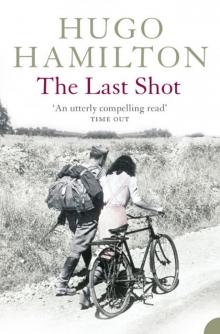 The Last Shot
The Last Shot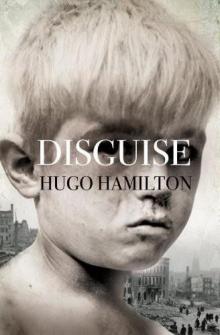 Disguise
Disguise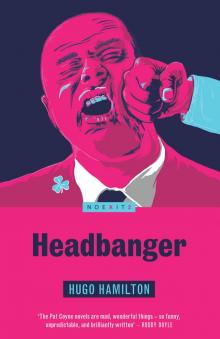 Headbanger
Headbanger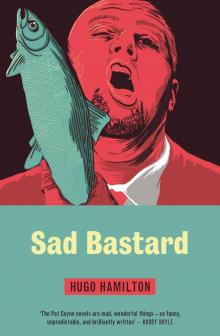 Sad Bastard
Sad Bastard The Speckled People
The Speckled People